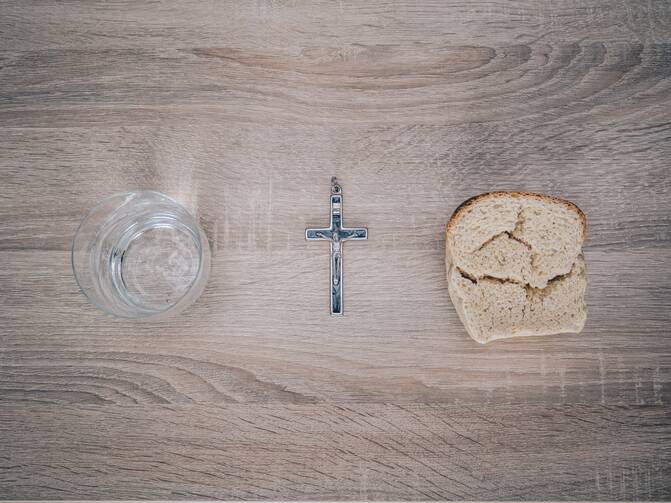A Reflection for Monday of the First Week of Lent
Find today’s readings here.
And he will separate them one from another, as a shepherd separates the sheep from the goats. (Mt 25:32)
Often, when the Bible talks about sheep, the message is comforting and uplifting. Not so in today’s Gospel. Here, we mortals are still presented as grazing animals, but the Good Shepherd is no longer guiding and protecting us. He is sitting in judgment, and for those who went astray in earthly life the situation is now grim. This parable is vivid and direct, exposing harsh realities in plain language instead of cloaking them in metaphor. Modern readers may feel a profound sense of unease, because even though we understand that corporal works of mercy are important, it’s often unclear how we should approach them. We are constantly presented with decisions: Should we give our resources to our parish, an earthquake relief fund or the homeless woman in the Menard’s parking lot? Should we volunteer for Prison Ministries or a homeless shelter, help with the parish picnic or coach a son’s baseball team? In light of this parable, the choices seem very consequential indeed, but they are already hardchoices, and it can be difficult to banish thoughts of “the least of these” every time we pitch a fundraising brochure into the recycling bin.
If those questions become overwhelming, it may help to turn back to the passage from Leviticus. God’s instructions to the Israelites offer a sturdy entry point into moral improvement. This advice is relatively easy to interpret and apply. Do not steal or cheat people. If someone works for you, pay him fairly. Never mock or take advantage of vulnerable people, and don’t spread gossip about your relatives. Be especially scrupulous about honesty. This is a point of particular emphasis for the passage, which mentions both lying and swearing falsely, and adds that those empowered to pass judgment on others must be fair, showing “neither partiality to the weak, nor deference to the mighty.”
The church offers special graces during Lent, helping us conquer the sins and vices that may be poisoning both our relationships and our souls.
This all sounds like solid advice, but compared to the high-flown imagery of the parable, the Leviticus passage may seem plebeian. It’s morality for beginners. Instead of seeing Jesus in everyone we meet, the Leviticus passage merely warns not to stand idly by when a neighbor’s life is in danger. It seems like a fairly low bar. As Lent begins, however, we must ask ourselves with great seriousness: How are we faring, even with the kindergarten morality? Are we honest and faithful to our spouses, children and friends? Do we make a habit of telling the truth? Are we prone to gossip, or tempted to take advantage of others’ weakness? These are the kinds of failings that can seep into our daily lives, undercutting our moral growth and damaging our human relationships.
Lent is the perfect season for working to overcome those failings. The church offers special graces at this time, helping us conquer the sins and vices that may be poisoning both our relationships and our souls. If we reflect more deeply, we may find that the thing we’ve come to regard as a minor peccadillo may really be driving a wedge between us and our family, our friends and our Lord. Each year in this penitential season, we are urged to take a hard, unsentimental look at our lives and recognize what needs to change. Working a little harder to clear the relatively low bar of Leviticus may be what it takes to get real insight into our own earthly callings, and the manner in which God wants each of us to serve “the least of these.”
By loving and serving the people around us, we can love and serve Jesus himself. To do that effectively, we must first turn away from sin. Behold, now is the day of salvation.
Get to know Rachel Lu, contributing writer
What are you giving up for Lent?
I give up sweets, with some exceptions for special occasions, but also this year I'm giving up popular music. I've realized that I use it pretty heavily as a mood regulator, which isn't wrong, but maybe it would be good to try for more spiritual sources of sustenance.
Do you cheat on Sundays?
I wouldn't call it cheating, but yes, we indulge on Sundays. You really get to love the Lord's day in Lent.
Favorite non-meat recipe
Chickpea curry is a favorite, and I actually love how in Lent my family lets me make it with minimal complaining.
Favorite Easter artwork
What is Truth? by Nikolai Nikolaevich Ge.
Favorite Easter memory
When I was 20, I studied abroad in Palestine, and on Holy Saturday a couple of friends and I camped out on the Mount of Olives, just in a little wooded area overlooking the Old City. I didn't sleep, though. I read the Gospel of Matthew all the way through, then sat quietly under the stars thinking and praying until morning. I wasn't Catholic yet, and I wouldn't say I had a mystical experience as such, but I think that was the night I suddenly found myself understanding why Catholics invoke saints in their prayers. They felt so close. I suddenly grasped how we were all, living or dead, part of one family. That Easter is still a vivid memory for me.








